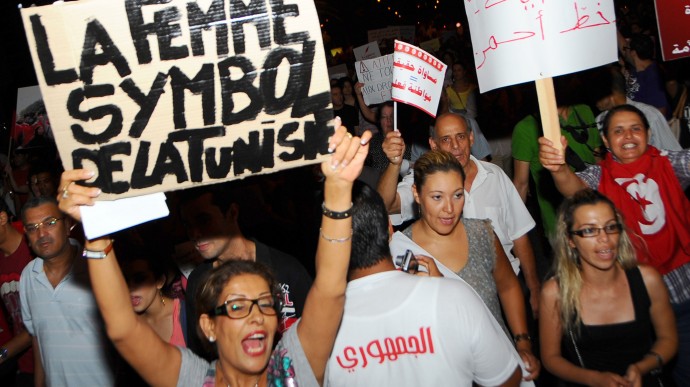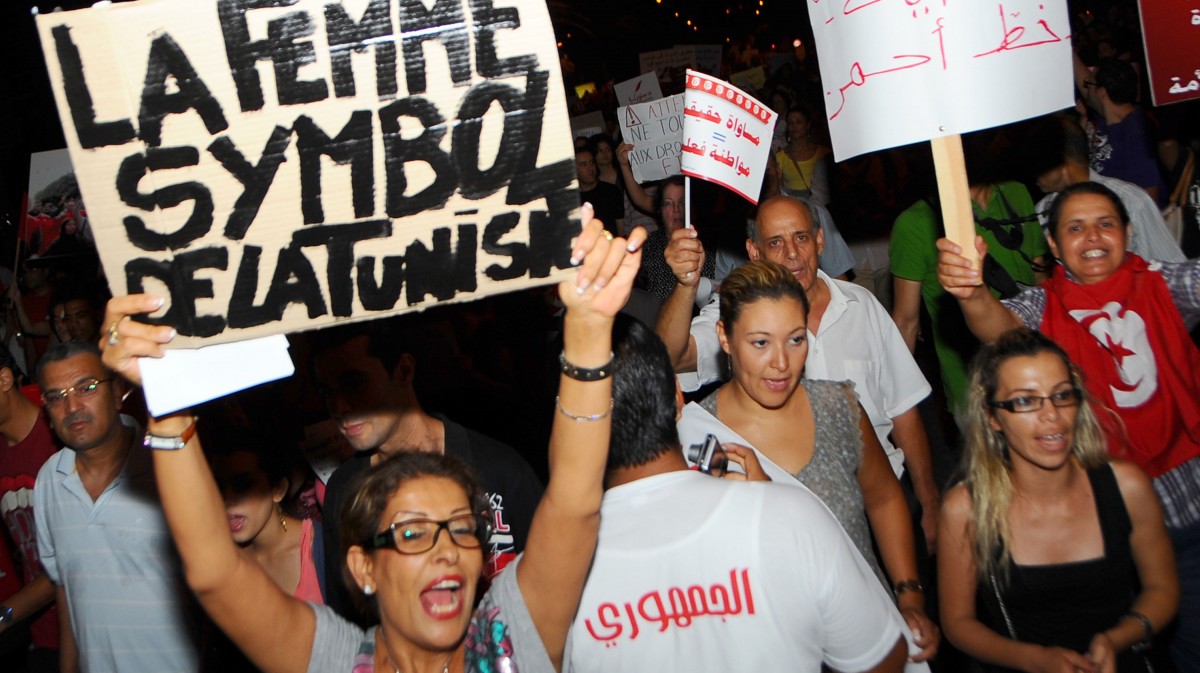
(Mint Press) — “We are proud of Tunisian women … and we will not let Islamists turn our spring into a winter,” said Sami Layouni, a 40-year-old man who was amongst protesters in Tunisia’s capital this week calling for the country’s government, led since October by Islamist moderates Ennahda, to turn away from the influence of hardline Salafi Muslims who want to roll back the clock on women’s rights.
And Tunisia is not the only country experiencing a push from extremists looking to implement an extreme version of Islam called Salafism, also known as Wahhabism.
Moreover, Qatar, Saudi Arabia and the U.S. are lining up with financial and military support for the extremists, whose ranks are growing exponentially.
Now, countries across the Middle East that won democratic governments after the Arab Spring revolts are increasingly facing pressures from the well-funded extremist groups as they work to democratize.
The scene in Tunisia
Activists like Layouni, who was one of a few men at the protest which drew nearly 6,000, want the government to focus on issues such as unemployment and regional development, Reuters reports.
Salafi activists are pressuring the government to add a provision in the country’s constitution currently being drafted to deem women to be “complementary to men”. Meanwhile, activists are pushing for a pioneering 1956 law granting women full equality with men to remain in place. Other provisions of the 1956 law wrote into the country’s constitution language which described women and men as equal, banned polygamy and introduced civil divorce and marriage.
Layouni added, “We are here to support women and to say there are men who stand for women’s rights,” according to the news service. He also carried a sign that read: “A woman is no compliment, she is everything.”
Others held signs and banners reading: “Rise up women for your rights.”
Tunisia has long been considered one of the most liberal countries in the Arab world, prior to the Ennahda party coming to power following the mass uprising which led to the overthrow of Zine el-Abidine Ben Ali’s regime in January 2011.
Ennahda member Farida al-Obeidi, chair of the constitutional assembly’s human rights and public freedoms panel in Tunisia, argued that the wording of the draft constitution was not a backward step for Tunisian women. “Sharing of roles does not mean that women are worth less than men,” she said.
However, women’s rights groups in the country see the clause differently. Ahlam Belhadj, chairperson of the Democratic Women’s Association, spoke out against the measure, saying, “Major retreats usually begin with one step,” and added, “If we stay silent today, we will open the door to everything else and end up surprised by even more serious decisions.”
The Ennahda Movement, which was banned under the country’s former ruler, is experiencing pressure from hardline Salafi Muslims, calling for the introduction of Islamic law and secular opposition parties as it works to rebuild Tunisia in the wake of the country’s revolution.
Additional protesters in Tunisia were also gathered in Sidi Bouzid, the hub of the 2011 uprising, on Tuesday, according to news reports inside the country.
High unemployment rates and poor living conditions are being experienced in the region.
Members of trade unions, civil society groups and employer organizations caused shops and offices to shut down as they marched toward the court house staging a strike. Tunisia’s main union, the UGTT, called the strike to put pressure on the government to release detained activists and to develop the marginalised region.
“The people want the fall of the regime!” and, “Justice, woe to you, Ennahda has power over you!” they chanted.
Demonstrators denounced authorities for suppressing recent protests and urged them to free activists arrested last week during demonstrations that were dispersed by police firing tear gas and rubber bullets.
Syria facing similar pressures from extremists
Syria also has experienced an increasing number of Islamist fighters among the ranks of rebels over the past months.
As MintPress previously reported, the media was slow to report on the presence of al-Qaida and other jihadists on the ground in Syria, which has been ongoing for many months.
New York-based Human Rights Watch (HRW) said in an open letter to the Syrian opposition that armed rebels have themselves committed “serious human rights abuses.”
“The Syrian government’s brutal tactics cannot justify abuses by armed opposition groups,” said HRW Middle East director Sarah Leah Whitson. “Opposition leaders should make it clear to their followers that they must not torture, kidnap or execute under any circumstance.”
But the U.S. has decided to side with the rebels, as MintPress also recently reported that U.S. President Barack Obama signed a “secret order” authorizing the CIA to provide material and intelligence assistance to Syrian rebels attempting the overthrow of Bashar al-Assad’s regime. The 17-month civil war that has killed an estimated 20,000 has grown increasingly violent in recent weeks because of a strong rebel front in Aleppo, Damascus and other Syrian cities. A rash of defections in the Assad government has shown the fallibility of the regime, struggling to maintain control of the increasingly divided country.
Other countries, including Qatar, Saudi Arabia and Turkey, have all pledged financial and material assistance to fighters, many of whom are non-Syrian fighters. The inflow of arms and financial support for the Syrian opposition could prove to be problematic given the large number of foreign fighters, many of whom are fighting as members of al-Qaida, Salafi and radical jihadi organizations.
The U.S. has previously tried to impose tough sanctions against Syria through the U.N. Security Council, but resolutions calling for sanctions and for Assad’s removal have failed to gather the necessary support because of consistent vetos by Russia and China.
Forces inside Syria continue to try to advance against Syrian government forces, relying mostly upon smuggled weapons and stolen supplies. The ranks of the Free Syrian Army, the largest opposition force, are a mix of volunteers and defecting soldiers numbering perhaps up to 40,000, according to some estimates.
Recent reports have indicated that foreign fighters continue to enter Syria, hailing from Chechnya, Pakistan and Arab Gulf countries. The majority subscribe to conservative jihadist and Salafi ideologies, and some claim to fight as part of the al-Qaida terrorist organization.
A dangerous situation with enormous security challenges for a future transitional government could be created if Assad goes the way of Gadhafi, given the U.S. support of the fighters.


